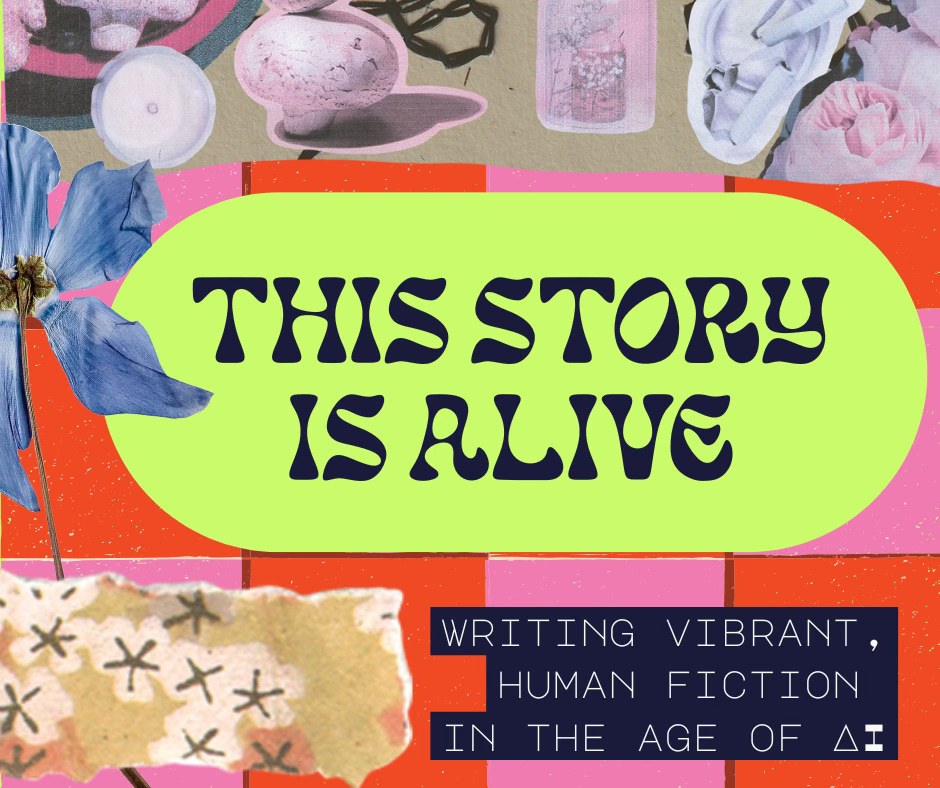Today as I was pouring pumpkin spice creamer into my basic ass’s morning coffee, I was thinking that maybe I would write a Substack post with the subject line HOW TO WRITE A NOVEL and the entire body of the post would just say I DON’T KNOW.
Next weekend I am teaching a class called This Story Is Alive: Writing Vibrant, Human Fiction in the Age of AI. It’s all about how to be a mess and why that’s better, and how to stop writing things that are neat and tidy and follow all the rules, but also how to follow deeper rules, the kind we already kind of know but might have forgotten. (Come if you want, hey? It’s supposed to be a promo for pre-ordering my new short story collection, but if you can’t swing that right now, just sign up anyway.)
I’m trying to sleep lots, I’m trying to love the world.
Secretly I’m not afraid of AI at all, but rather I think it will illuminate the true strengths of human beings. I think we’ve spent far too long worshipping human skills that are actually not our forte (read: boring and difficult) such as sounding the same as everybody else and thinking in a linear fashion and —
Oh. So that’s what this post is about. How I’m very good at masking, how I’ve been masking my whole life — I’m one of those 1990s AFAB undiagnosed autistic/ADHD/gifted kids who are all over the internet, I know, I’m sorry, we’re so cliche, at this point, but the internet really was built by and for auties, to be honest with you (this is our house, FFS) — and now robots exist who are very good at doing all the things I’m very bad at, such as sounding like everybody else.
I think it’s cute when I think I’m writing something philosophical, but it turns out I’m just writing about me.
Then again, maybe that’s true of everything.
How to write a novel: it’s like crossing a rickety bridge, so don’t look down. Just keep moving forward and forward. Your first act will be tight as hell. By the second act, you’ll be wondering what even an act is, what a novel is, what you’ve done, why you’ve done this. You’ll wonder if maybe the reason second acts are so difficult is that nobody actually knows how to write a second act. By the third act, you’ll know what’s wrong — everything — and you keep writing anyway, even though you’ll have to change it all, because the third act is a mirror of the first act, but that will have to all be changed anyway, now that everything’s wrong.
Stick it in a drawer for a year.
Throw it out — metaphorically, for god’s sake — and start again with a new protagonist.
Mourn your old protagonist, the wild and free language of your first draft! That disaster! What have you done?
Read a Substack that sounds like it should end with a piece of wisdom, because it should be written by someone who has actually finished their novel and can now think back and say, God, I realize now that the true How To Write A Novel is the friends we made along the way, and crossing that rickety bridge is the best thing I’ve ever done.
In the first act of my life, I observed the world and the people in the world. In the fourth grade, a boy said “I bet you can’t not giggle” to me and another girl and I thought he really wanted us not to giggle. My face was like a stone and I thought I had won. But then the other girl giggled, and it turned out to be a different kind of game than I’d thought it was.
And I thought to myself — really, I actually thought this — I figured it out. I know the secret now.
And I’ve made a life saying the quiet parts out loud. I don’t know how to write a novel yet — maybe I won’t know until I’m done, or maybe I won’t even know after that — but I think I know, now, how to write fiction. And how to write fiction is to hold the tension between the exoteric parts of writing fiction (characters, plot, setting, voice…) and the esoteric parts of writing fiction (the quiet parts, the secret parts, the transmutation of consciousness into language, into form.) The robots can do exoteric just fine. But the esoteric parts are up to us.





Oh didn't expect tears to well up while reading this. I feel like that happens when I read your work. In the best possible way.